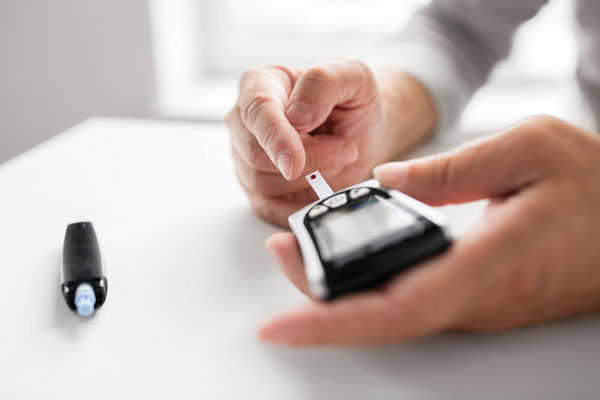Living with Diabetes and Cancer
by Megh D. Doshi, MBBS and Sonali N. Thosani, MD
Nearly 34 million people in the United States are living with diabetes. Of those, 1 in 5 (or around 7 million people) don’t know they have it. An even greater number, 88 million, have a condition called pre-diabetes, which means they are at a very high risk of developing diabetes.
Diabetes: An Overview
Glucose, or blood sugar, is a molecule that supplies energy to the various organs in your body. The food you eat contains varying amounts of glucose, which is metabolized by your body to sustain its daily activity.
Your body tightly regulates glucose levels in the blood through a hormone called insulin, which is produced by the pancreas. In people with diabetes, the body either doesn’t make enough insulin or can’t use the insulin it makes as it should. When this happens, too much blood sugar stays in the bloodstream. Over time, this can cause serious health problems.
Diabetes in People with Cancer
For a person with diabetes, cancer and certain cancer treatments can affect diabetes control. Also, cancer treatments may elevate blood glucose in a person with no previous diabetes, a condition known as secondary diabetes. For example, some immunotherapy drugs, which are used to treat a variety of different cancers, can – though rarely – cause Type 1 diabetes, a condition in which the body stops making insulin.
You are at higher risk of developing secondary diabetes if you are undergoing chemotherapy treatment, have had your pancreas removed, are using a feeding tube, or have taken high dosages of steroids. Other factors that can contribute to high blood glucose include the cancer itself, uncontrolled pain, decreased physical activity, and physical or emotional stress.
Cancer treatments may elevate blood glucose in a person with no previous diabetes, a condition known as secondary diabetes.
Signs + Symptoms of Diabetes
People with high blood glucose experience excessive thirst, frequent urination, blurry vision, and weight loss. If you begin to have these symptoms, you should tell your doctor and have your blood glucose levels checked. If you have a history of diabetes, it is important to check your blood glucose level during chemotherapy and to alert your doctor if you develop these symptoms or if your blood glucose is elevated.
Diabetes Risks + Complications
If you have diabetes and your blood glucose level is not controlled, you are at increased risk of heart attack, stroke, and other complications, such as kidney failure, blindness, the need for amputations, and nervous system damage. If you have secondary diabetes, the short-term increase in blood glucose may not contribute to long-term complications. However, if your blood glucose level is high, your cancer treatment may have to be put on hold until your blood glucose is back under control. Short-term complications of secondary diabetes include infections and dehydration.
Quick Tips for Keeping Your Blood Sugar in Check
Your doctor or nurse can give you more specific recommendations, but adopting these healthy habits can help keep your blood glucose level in check:
- Exercise at least 30 minutes a day.
- Eat a diet rich in fresh fruits and vegetables.
- Limit your carbohydrate intake whenever possible. If you must eat carbs, choose complex carbohydrates (such as whole grains, brown bread, fruits, legumes, nuts, and seeds) instead of simple carbohydrates (such as chocolate, bottled juices, cake, and white bread).
- Decrease saturated fats in your diet.
- Avoid sugar-sweetened beverages.
Diabetes Treatment, Management, & Monitoring
If you have diabetes, you need to have your cholesterol levels and blood pressure monitored. You should also undergo annual screening for diabetic eye and kidney disease.
Oral medications are available to treat diabetes, but you and your doctor will need to take into consideration how their side effects might affect your cancer treatment. If your blood glucose level remains high despite the use of oral medications, you may be started on insulin therapy. This is usually temporary; however, some people may need to continue insulin therapy indefinitely to maintain good blood glucose control.
Your doctor may monitor your diabetes control with a hemoglobin A1C test. This blood test reflects your average blood glucose level over a three-month period. But, for some people, especially those who have recently received a blood transfusion, this test is ineffective. Therefore, it’s important to learn how to check your blood glucose level at home using a glucose meter
Your doctor may advise you to check your glucose level before or after meals, and will use this information to decide if any changes need to be made in your course of treatment. You may also need to adjust your diet and activity level to help manage your blood glucose.
Recent medical advances have provided a new method to monitor blood glucose – continuous glucose monitoring. A continuous glucose monitor uses a tiny sensor wire placed under the skin to track your glucose levels throughout the day and night. It can alert you if your levels go too high or low, and may even allow your doctor to remotely view your blood glucose level without requiring a visit to the clinic. This new type of monitor eliminates the need to prick your finger. You should ask your doctor for more information.
You can also ask your doctor for a referral to diabetes self-management education and support services. These services are provided by a diabetes educator and focus on helping people with diabetes learn how to take the best care of themselves. The goal of DSMES is to help you make better decisions about your diabetes management, such as eating healthier, being active, and monitoring your blood sugar.
Managing diabetes while living with cancer can be challenging. It requires coordination and communication among you and your healthcare team. But getting your diabetes under control is necessary for receiving the treatment you need for your cancer.


Dr. Sonali Thosani is an associate professor in the Department ofEndocrine Neoplasia and Hormonal Disorders at the University of Texas MD Anderson Cancer Center in Houston, TX, with clinical interests in the management of steroid-induced hyperglycemia in people with cancer and the management of diabetes and other endocrine complications resulting from cancer treatment.
Megh Doshi (right) is a medical student with a strong interest in helping people with diabetes improve self-care and glucose management through lifestyle changes.
Visit the American Diabetes Association website, diabetes.org, for more information about managing and monitoring diabetes, along with a variety of diabetes-friendly recipes and other resources.
This article was published in Coping® with Cancer magazine, January/February 2021.


